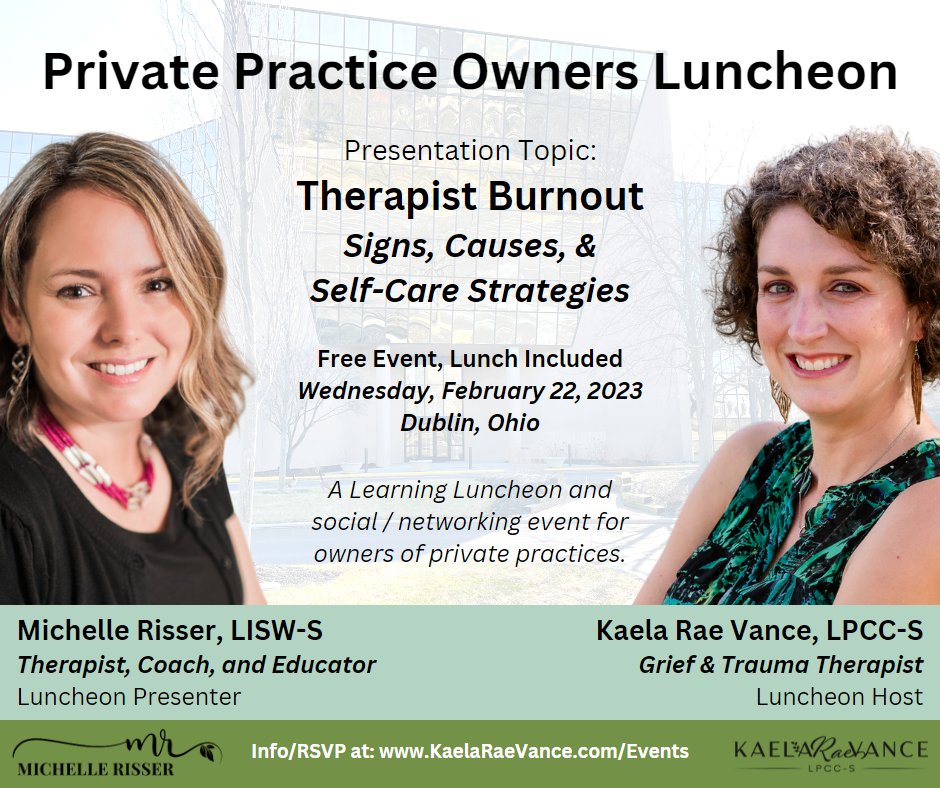The Toll of Therapy: Addressing Burnout Among Mental Health Professionals
- Kaela Rae Vance, LPCC-S
- Feb 3, 2023
- 3 min read

Mental health therapists play an essential role in helping individuals and communities address mental health concerns. However, the work can be challenging and emotionally taxing, leading to burnout. Therapist burnout has become an increasingly pressing issue in the United States, with many mental health professionals reporting feelings of exhaustion, cynicism, and a reduced sense of personal accomplishment.
One reason for therapist burnout is the high demand for mental health services.
According to the National Institute of Mental Health, approximately one in five adults in the United States experience mental illness in any given year. With the COVID-19 pandemic exacerbating stress and anxiety, the demand for mental health services has only increased. Therapists may find themselves working long hours, taking on more clients than they can handle, and struggling to maintain a healthy work-life balance.
Another factor contributing to therapist burnout is the emotional labor required in the profession.
Therapists are often exposed to their clients' traumatic experiences and must navigate complex ethical and legal considerations. They may experience secondary trauma, which can lead to emotional exhaustion and a reduced sense of personal accomplishment.
The impact of therapist burnout on mental health professionals is significant. Burnout can lead to reduced job satisfaction, decreased productivity, and turnover. Mental health professionals who experience burnout may also struggle with their own mental health, which can affect their ability to provide quality care to their clients.
To address therapist burnout, mental health organizations and employers can prioritize staff wellness and provide support for mental health professionals. This can include training on self-care, access to mental health services, and regular check-ins with supervisors. Therapists can also take steps to prevent burnout by setting boundaries, practicing self-care, and seeking support when needed.
Here are ten tips for therapists to avoid workplace burnout:
Set boundaries: Establish clear boundaries around your working hours and stick to them. Don't let work take over your personal life.
Practice self-care: Take care of your physical, emotional, and mental health. Make time for exercise, healthy eating, and relaxation activities.
Prioritize your workload: Learn to prioritize your workload and focus on the most important tasks. Avoid taking on too many clients or projects at once.
Seek supervision and support: Regular supervision can help you manage your caseload and deal with difficult clients. Seek support from colleagues, friends, or family members when needed.
Take breaks: Allow yourself to take breaks throughout the day to recharge and refocus.
Learn to say no: It's important to know your limits and be able to say no when you need to.
Manage stress: Identify the sources of stress in your work and find ways to manage them. This might include relaxation techniques, mindfulness, or other stress-reducing activities.
Connect with your values: Remember why you got into this work and connect with your values. This can help you stay motivated and engaged.
Practice gratitude: Take time to reflect on the positive aspects of your work and express gratitude for them.
Take time off: Make sure you take time off regularly to rest and recharge. Use your vacation time and take breaks during the day to avoid burnout.
It's important to implement these, or similar methods to mitigate workplace burnout in order to maintain mental health professionals' well-being, reduce turnover, and provide high-quality care to clients.
Overall, therapist burnout is a serious concern that requires attention and action. By addressing the factors contributing to burnout and providing support for mental health professionals, we can work towards a healthier and more sustainable mental health workforce.
Upcoming Columbus Private Practice Owners Luncheon: Therapist Burnout - Signs, Causes, & Self-Care Strategies.
Therapists should attend the upcoming luncheon which will include a presentation on: "Therapist Burnout - Signs, Causes, & Self-Care Strategies". This is a Learning Luncheon and social / networking event for owners of private practices. It's a free event, and lunch is included.
The event will provide a space for mental health professionals to connect with one another, share their experiences, and discuss practical solutions to address burnout. It's an important opportunity for therapists to invest in their own well-being and professional development, and to contribute to a healthier and more sustainable mental health workforce.


Comments